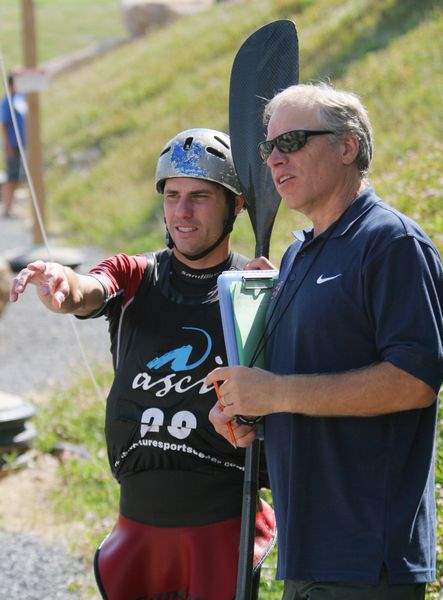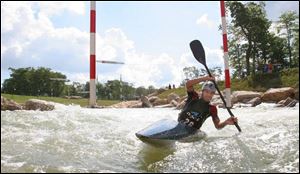
Sylvania native Parsons ready for second Olympics
7/24/2008
Scott Parsons talks with his coach, Silvan Poberaj, during an Olympic training session. Parsons also competed in the 2004 Olympics.
TIMOTHY JACOBSEN / AP

Scott Parsons, a St. John's Jesuit graduate, negotiates a gate during a training session in McHenry, Md., for the Olympics.
Setting the alarm clock for a reasonable time. Eating healthy, but not entirely healthy. Seeing more of his longtime girlfriend.
This was all very appealing to a worn out Scott Parsons in 2005. The early morning kayaking training was becoming boring and tiresome, and thoughts of declining skills began creeping up in Parsons' mind. He considered quitting for about a year following the 2004 Olympics, while still training, although not consistently. His father assumed Parsons was done, and Parsons' competitors hoped he was. But Parsons wasn't done.
"I'm sure I would be pretty happy had I stopped after Athens," Parsons said. "I definitely would have had a happy life had I stopped."
He's also glad he didn't stop.
Refreshed and refocused, Parsons, a Sylvania native and graduate of St. John's Jesuit, has returned to the pinnacle of his sport and will compete in his second Olympic games next month in Bejing.
Parsons, 29, and his four U.S. teammates will leave tomorrow for San Jose before heading to Bejing on Friday. The kayak competition is scheduled for Aug. 11-14.

Scott Parsons talks with his coach, Silvan Poberaj, during an Olympic training session. Parsons also competed in the 2004 Olympics.
"He's raced pretty well so far this year," U.S. coach Silvan Poberaj said. "He seems to be in pretty good shape, but if you're familiar with slalom, it's pretty hard to predict what will happen in the race."
Parsons, who lives in Bethesda, Md., finished sixth in 2004, about which he was "content." He qualified for this year's games in part because of a bronze medal finish at the world cup in Augsburg.
"Given the size of the race [in 2004] and the importance that's placed on it, I had two runs that I was pretty happy with," said Parsons, who is ranked ninth in the world. "I could have done better, but I definitely could have done worse."
Parsons considers the venue in Bejing "one of the most challenging courses in the world." He finished third there at a test event a year ago and has trained in those waters several other times.
Similar to alpine skiing, a whitewater kayaking course consists of 18 to 25 gates. Six of the gates are marked as upstream, requiring paddlers to progress in an upstream motion. A two-second penalty is elicited for coming in contact with a gate.
Since the Athens games, the international federation that governs kayaking revolutionized the sport by reducing the minimum size of the boats from four meters to 3.5 meters. This seemingly could have hindered Parsons, a veteran entrenched in a normal routine. Turns out, the rule changes invigorated him.
"That was exciting and got me interested again," Parsons said. "The technique and strategy have changed a lot with these new designs. They're shorter, quicker, and more fun. Whatever apathy I had was sort of erased with the excitement of learning new techniques."
Parsons began competing at about 9 years old, following in the steps of his elder brother, Brian, and father, Bill. Since there is no whitewater in Toledo, Parsons would often head elsewhere to train, although he was also known to put his kayak in the waters of Oleander Park in Sylvania.
"We would put together training plans and he would do it before school, and we're talking about grade school," Bill Parsons said. "I'd come home from work and he'd be watching kayaking videos, trying to learn things just from observing. He wasn't forced to do it because that's a formula for failure. We knew that he wanted to do it and we gave him aggressive training schedules."
Soon Parsons' lifestyle will begin to parallel 2005 when he wasn't so aggressive. He'll train a little but doesn't plan to make another run at an Olympic team or even compete in major competitions. Instead, Parsons plans to relax, enjoy life, and he hopes to go back to work where he makes prostheses for wounded war veterans. With likely just one more significant race to go in his career, Parsons isn't thinking medal or bust.
"I just want a result I'm happy with," Parsons said. "A medal would be great for sure, but I don't want to place too much importance on that."
Contact Ryan Autullo at:
rautullo@theblade.com